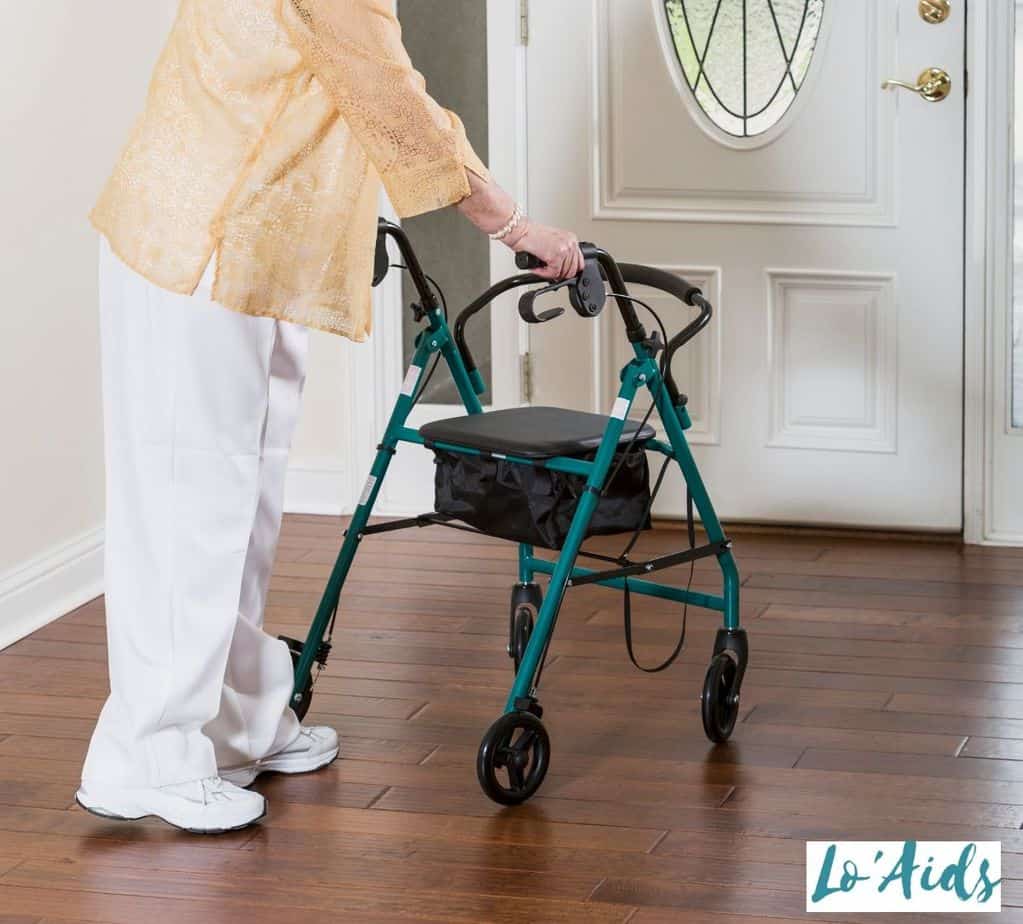There’s a lot of confusion surrounding the topic of whether or not Medicare covers walkers.
If it does, then how much?
Does it also cover upright walkers, and what about rollator walkers?
As there are many things to know, the answer requires a detailed discussion rather than a ‘yes’ or ‘no.’
Stick around as we answer all your queries related to the coverage of walkers by Medicare.
Does Medicare Pay for Walkers?

Yes, Medicare does pay for walkers. However, you’ll have to meet some basic requirements in order to get that claim.
Medicare covers standard walkers and rollator walkers under the Durable Medical Equipment (DME) category.
Is an Upright Walker Covered by Medicare?
An upright walker or standup walker helps prevent slouching of the back and is somewhat similar to a rollator.
They help maintain proper posture and are also a mobility aid. It also comes with two pairs of wheels, just like a rollator.
The significant difference lies in the position of the handle. Handles of upright walkers are much higher as they are made to be positioned below your elbows.
Although Medicare considers upright walkers as a piece of durable medical equipment, it does not cover them.
The reason for this is most upright walker suppliers don’t accept Medicare. So, you’ll need to pay for it yourself if you have the requirement for an upright walker.
Do Medicare Cover Rollator Walkers?

Yes, medicare cover rollator walkers. A rollator walker is considered Durable Medical Equipment, but it must be prescribed by your doctor as necessary to be covered by Medicare.
Also, both your doctor and supplier should accept Medicare for a rollator walker.
What is the Difference Between Walkers and Rollator Walkers?
Standard or traditional walkers come with four static legs, whereas rollator walkers have two wheels to make movement easier.
Standard walkers provide better stability, albeit being slow due to the constant lifting that they require. They are suitable for a temporary injury that restricts putting pressure on any of one or other leg.
A standard walker consumes a lot of energy and hence should ideally be used indoors.
Rollator walkers provide easy movement owing to the wheels at the expanse of lesser stability. They are suitable for someone looking to move around quicker and are tired of constantly lifting around their walkers.
It provides a faster way to perform your daily activities. A rollator walker also costs much more than a standard walker as they come with many features.
Features such as hand brakes, lightweight frame, seat, wheels, etc., make the rollator walker a much more convenient choice.
How Do I Get Medicare to Pay for a Walker?
In order for Medicare to pay for a walker, you’ll need to meet Medicare requirements.
If you fulfill these conditions, you can quickly get Medicare to pay for the cost of walker. The three requirements to get the same are;
A Doctor Must Prescribe the Walker
A licensed medical practitioner should have prescribed your walker, just like in the case of prescription medication. This establishes the fact that the requirement for a walker is genuine and much needed.
Here’s an article that can help you choose: 3 Wheel Walker For Seniors
The Walker Must Be Deemed Medically Necessary

If you diagnose treatment, illness, injury, or any disease that requires you to use a walker, you’re qualified to get a walker from your Medicare. In such cases, a walker is deemed ‘medically necessary.’
The term medically necessary refers to the situation when a doctor thinks that a piece of equipment can help diagnose or treat a health issue.
A qualified health care provider should do the assessment and suggest the rollator walker or standard walker as a medical necessity.
Both the Doctor and the Supplier Must Accept Medicare
The doctor writing your prescription and the supplier from where you plan to get your walker must accept Medicare.
So, double-check with your supplier if they accept Medicare assignments or not. That way, you’ll know beforehand where you can buy a walker.
A participating medical equipment supplier (Someone who accepts Medicare) will only charge the coinsurance and part B deductible for the approved amount.
A non-participating supplier does not accept assignments and has no upper limit on what amount they can charge you. Medicare doesn’t pay for doctors or suppliers who aren’t enrolled in Medicare.
These three conditions are a must if you want Medicare to pay for a walker. Failing to comply with any of the conditions would result in making you ineligible.
ALSO READ: Used Walkers for Sale Near Me
How Much Will and How Often Will Medicare Pay for Walkers?
If you have already paid for the yearly part B deductible, Medicare covers around 80 percent of the Medicare-approved cost. You’ll need to pay for the rest 20 percent.
Depending on the duration for which it has been advised, you may need to buy or rent a walker. Medicare also pays for the rent of the walker if that’s what you need to do.

Medicare pays for you to have a new walker every five years. The life of a walker is considered to be five years-hence the timeline.
After the completion of the full five-year term, Medicare will examine the walker if its needs replacement.
They will only replace the walker if it’s completely worn out, so much so that it can’t be fixed anymore. If your walker can still be repaired, Medicare will cover the cost of repairs.
For this, you need to get your walker repaired by a Medicare-approved supplier. Also, if your walker is worn out from everyday use, Medicare can cover the cost of repair.
However, do keep in mind that you need to provide a new prescription every time you want a new one from Medicare.
In case you need to buy a new walker, ask your doctor for a new prescription at the end of each term.
FAQs
How much does Medicare pay for a walker?
Medicare pays for around 80 percent of the cost of walkers.
How much does a walker cost?
A walker can cost anything from as low as $30 to upwards of $500, depending upon the kind of walker you need. The cost of walkers increases proportionally with added features like weight capacity, comfortable grips, wheels, etc.
What if my rollator walker or standard walker is stolen or lost?
In the case of theft, Medicare will replace your walker or rollator with a similar item. You’ll need to provide evidence of the theft, like a police report, in order to get a replacement.
Which is better, rollator or walkers?
The answer to that question can vary from person to person. For a person with stability issues, walkers are better, while a rollator is the better fit for someone with mobility issues.
The Bottom Line
Walker and rollators come under durable medical equipment as per Medicare and hence are covered by it. However, your doctor must prescribe it in order to get it covered by Medicare.
Medicare also covers the cost of repair of your walkers or rollators and replaces them every five years. In the case of theft, Medicare also replaces your walker or rollator after getting proof, like a police report.

Does Medicare cover walkers? Let us know your opinion on this topic below!





